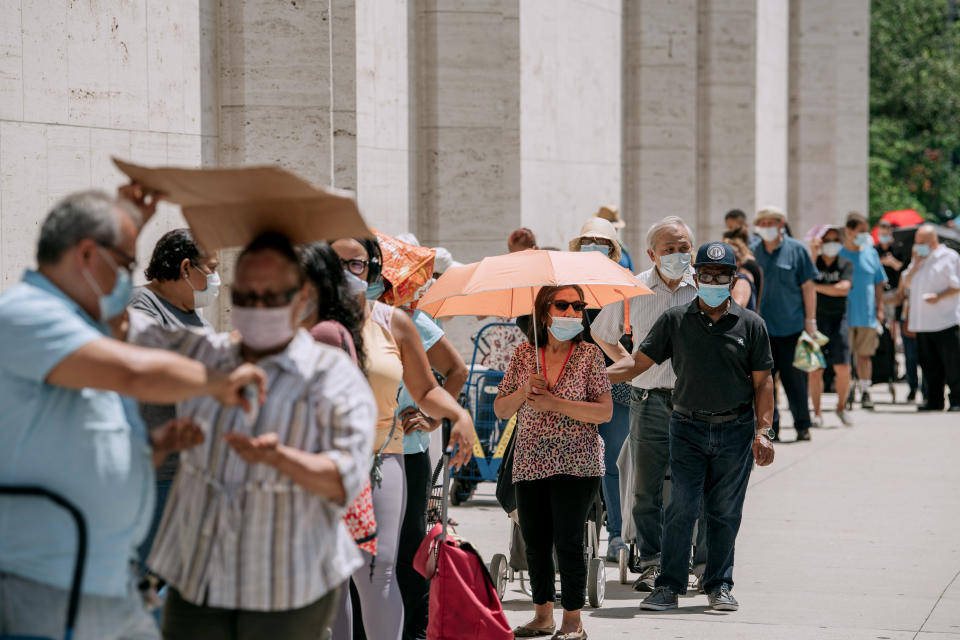Coronavirus stimulus: Indiana family details being left out of Trump unemployment benefits order
After receiving their last expanded unemployment check nearly a month ago, Joseph Sansone and his wife, Victoria, saw their income drop by 87%. They hoped to get a $300-per-week boost to their benefit after the president’s recent executive memorandum, but they receive too little from unemployment to qualify.
“I thought everyone was included,” said Joseph, who gets just $87 a week in unemployment. “I called to find out if you had to make at least $100 a week. Unfortunately, the website was right and we are ineligible.”
Joseph and his wife, who receives only $95 a week, are among the 6% of unemployment insurance (UI) recipients — or close to 1 million out-of-work Americans — who don’t qualify for the minimum set by the Lost Wages Assistance (LWA) program.

Jobless workers must receive at least $100 a week of unemployment benefits to qualify, leaving out many of the lowest income Americans who are likely struggling the most. It’s also a departure from the far more lenient minimum of $1 a week the CARES Act required for the extra $600 weekly bonus that expired at the end of July.
Read more: Coronavirus stimulus checks: What’s stopping a second round of payments?
“It just doesn't make any sense except to be cruel,” said Gbenga Ajilore, a senior economist at the Center for American Progress, a nonprofit for public policy research and advocacy, told Yahoo Money earlier this month. “What you're saying is that the people who are getting under $100 don't deserve extra benefits, but people who get over $100 deserve the benefits.”
‘It’s costly to be poor’
The $100 minimum was set to prevent fraud and abuse, a White House official told Yahoo Money. The $1 requirement under the CARES Act is too susceptible to gamesmanship, he said.
But for Joseph and Victoria, who were both laid off from their manufacturing jobs in Anderson, Indiana at the end of February, unemployment income has been their lifeline.

They each got the $600 weekly unemployment bonus that helped them pay all of their monthly utility bills and rent along with household supplies and everyday necessities. Now, they must choose which bill to pay using the $728 a month they get in benefits before tax. Their $625 rent would take up most of it.
“We have already received a notice to either pay rent or vacate our home,” said Joseph, who also has a daughter doing remote learning. “Bills are adding up fast that we can't pay.”
Read more: How to approach your finances and fears during a pandemic
They purchase only the necessities like hygiene items, barely put any gas in their car, and make very small payments on whatever bill they’re able to. They have exhausted all their savings and “no longer have a safety blanket,” Joseph said.
“It's costly to be poor because you have to make these trade-offs,” Ajilore said. “Housing, food, transportation, child care, health care.”
‘Deep down I am terrified’
There’s an economic impact, too, if these workers don’t get that extra in unemployment. While high-income earners curbed their spending the most during the pandemic, low-income families spent much closer to their pre-pandemic levels. In that way, they were supporting the economic recovery.
This comes as over 27 million Americans lost the extra $600 in weekly unemployment benefits at the end of July and have since seen a drop in benefits ranging from 52% to 72%, according to an analysis by Evercore ISI.

“We're shooting ourselves in the foot by leaving these people out,” Ajilore said. “When low-income people get that money, they put it right back into the economy.”
Read more: Here’s what you need to know about unemployment benefits eligibility
Joseph and Victoria call their employer every week to see when they’ll be recalled to work, but, so far, there have been no answers. They’ve had no luck finding another job to cover basic expenses and worry that they’ll soon get evicted.
“I spend all my free time applying for different jobs. During this pandemic, it seems to be extremely difficult,” Joseph said. “Deep down I am terrified that I won't be able to pay the bills.”
Denitsa is a writer for Yahoo Finance and Cashay, a new personal finance website. Follow her on Twitter @denitsa_tsekova.
Read more:
Analysis: 1 in 3 jobless Americans could be left out of Trump's action on unemployment
Even as GDP tanked, personal income grew thanks to government support
Read more personal finance information, news, and tips on Cashay
Follow Yahoo Finance on Twitter, Facebook, Instagram, Flipboard, SmartNews, LinkedIn, YouTube, and Reddit.

 money
money 
